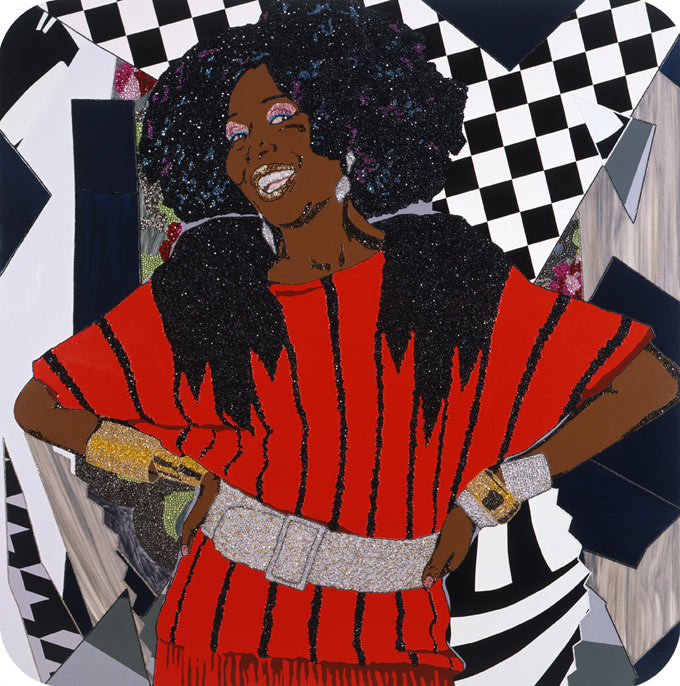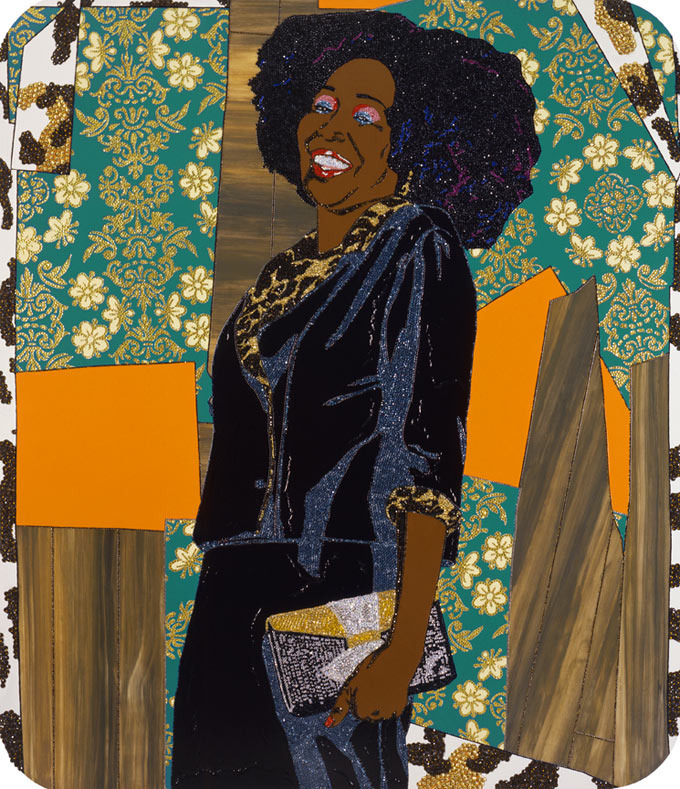
Mickalene Thomas, Dim All The Lights, 2009.
In the early 1970s Sandra Bush entered the New York fashion world as a tall, willowy beauty dreaming of fame as a runway model. With characteristic determination, she quickly garnered considerable attention, earning a reputation as a young, promising figure of chic style and charisma—a natural. Despite talent, youth and initiative, however, Sandra’s modeling ambitions were challenged by circumstance. By the time she had reached her early 20s, the fledgling model had experienced chronic illness, domestic violence and divorce. She was also the mother of two young children: my brother, Paul, and me.
My mother’s drive for stardom would always be hard-fought. Her lifelong struggle with illness began in infancy. Together with her younger brother, Richard, she was diagnosed with the congenital blood disease sickle-cell anemia, a condition found most often in people of African descent. Throughout her childhood in Camden, NJ, Sandra grappled with the challenges of this disorder, the first of many severe and painful ailments to come. Yet in spite of her illness, my mother was widely adored as a bright, lively and wildly fun character.
She fell in love young, meeting my father as a high school student and marrying him shortly following her graduation in 1969. The union was disastrous. Passion quickly turned to volatility, and after my brother and I were born, the relationship became defined by violence and abuse. My youthful mother was forced to seek divorce. With an untenable marriage and two young children to care for, her future seemed precarious. The world, it seemed, had taken a cruel turn.
It was at this time that my mother seized a sense of conviction, channeling her efforts toward a career in fashion. In New York her vivid personality and aristocratic features generated a stir, and with zeal, fortitude and resolve, she developed the foundation of what she dreamed would be a wondrous career in the spotlight. In parallel to her modeling activities, Sandra led a fund-raising initiative known as Better Days (1975–85), a series of parties, fashion shows and theater productions, the proceeds of which were donated to research for sickle-cell anemia. Developed in the hope of a better, healthier and more prosperous future, these spirited events became legend. However, my mother’s clique soon found itself immersed in a dangerous coil of substance abuse. When I was eight years old, Sandra began another romance, this time with a drug dealer. In due time, she would become dependent on drugs herself.

Mickalene Thomas, Mama Bush: (Your Love Keeps Lifting Me) Higher and Higher, 2009.
In the 1970s demand for black models was still limited to a small niche. The “Black Is Beautiful” movement was in full force, and black women slowly started to appear on the covers of magazines. But there was not room for many women who looked like Sandra. The sudden appearance of a slender African beauty, Iman, compromised my mother’s prospects for fame. And by the end of the decade, a destructive relationship, a stagnating career and substance dependency saw her once again overwhelmed by hardship.
As an artist I have always been astonished not only by my mother’s strength and tenacity but also by her sustained elegance and charisma in spite of harsh obstacles. Although she was not able to attain the adulation she desired from the fashion industry, her flair as a model and entertainer was perpetually self-evident. Sandra became the model for my own photographic investigations. We worked together in a productive artist-and-muse relationship, ultimately generating a series of photographs and paintings known as “Mama Bush.”
The “Mama Bush” paintings are iconic symbols of the tall, beautiful woman I had known—until 2010, when Sandra started to show significant signs of declining health. Though her resolve was strengthened by her faith in Buddhism as a productive life force, when her beauty started to fade, the real struggle began. At that moment I knew I had to make a film. Happy Birthday to a Beautiful Woman is a short documentary that celebrates Sandra’s life, revealing a different type of beauty and a different type of aging through a different type of portraiture that I hope conveys the inspiration I continue to draw from Mama Bush.
Mickalene Thomas’s film Happy Birthday to a Beautiful Woman will premiere on HBO on February 24, 2014. Click here for a schedule of showings.

